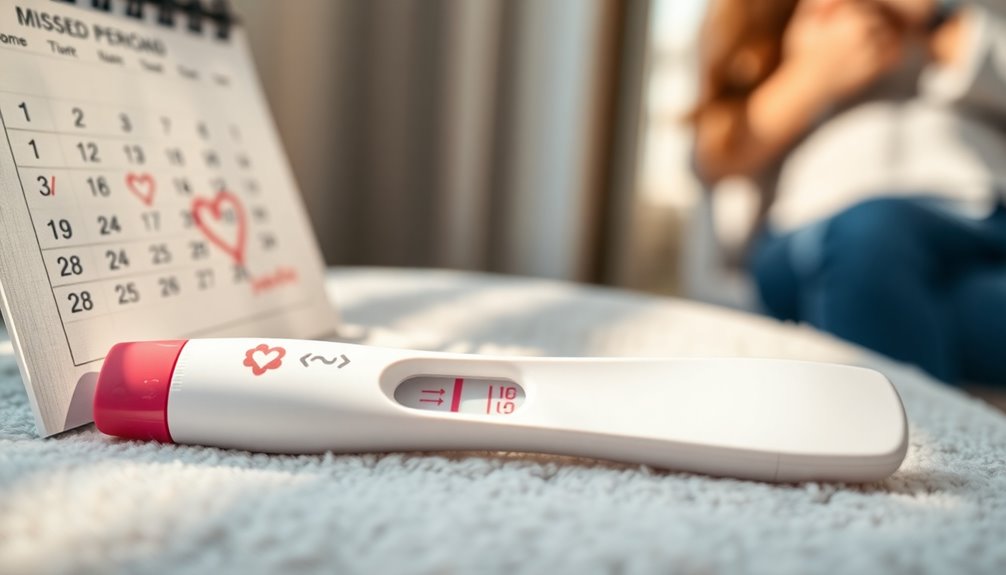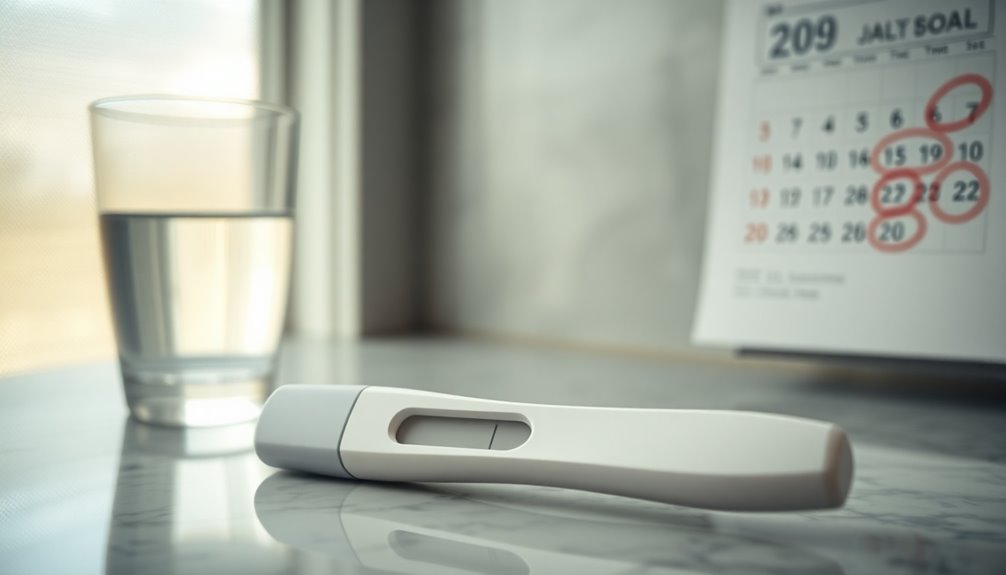Sexual activity doesn't directly delay your period, but it can be linked to factors that affect your cycle. Stress, which can increase with complicated sexual dynamics or relationship issues, may disrupt your hormones and lead to delays. Additionally, if you're worried about a possible pregnancy, that anxiety can also impact your cycle's regularity. While orgasms may relieve menstrual pain, they don't influence when your period starts. If you're curious about other factors that might affect your cycle, keep exploring this topic for more insights.
Key Takeaways
- Regular sexual activity can help reduce stress, potentially promoting a more predictable menstrual cycle.
- Emotional stress from sexual relationships or lack thereof may contribute to delayed periods.
- Orgasm provides pain relief but does not impact the timing of menstruation.
- Hormonal fluctuations related to sexual activity do not directly alter menstrual timing.
- Delayed periods may be influenced more by stress or hormonal imbalances than by sexual activity itself.
Menstrual Cycle Overview

Understanding your menstrual cycle is essential, especially since it can vary greatly from person to person. Typically, your menstrual cycle lasts between 24 to 38 days, with 28 days being the most common duration.
You'll experience three primary phases: the follicular phase, ovulation, and the luteal phase, influenced by hormonal changes.
Sometimes, you might notice irregular cycles, especially in the early years of menstruation. Factors like stress, weight fluctuations, and lifestyle changes can lead to delayed periods or irregular cycles.
While occasional irregularities can be normal, persistent issues may indicate underlying conditions like PCOS or thyroid disorders. If you find yourself experiencing significant irregularities, it's wise to consult a healthcare professional for guidance.
Hormonal Influences on Menstruation

Your menstrual cycle is driven by hormonal changes, mainly involving estrogen and progesterone.
Stress can throw these hormones out of balance, potentially delaying your period.
Additionally, birth control methods can dramatically alter your cycle, leading to lighter or missed periods altogether.
Hormonal Cycle Phases
As the menstrual cycle progresses, it's essential to recognize how hormonal changes shape its phases. The cycle consists of three main phases: the follicular phase, ovulation phase, and luteal phase.
Hormones like FSH and LH stimulate ovulation, while progesterone prepares the uterine lining for potential pregnancy. Throughout the cycle, estrogen and progesterone levels fluctuate, influencing menstruation timing and flow.
Irregularities can arise from factors like stress or hormonal contraceptives, causing variations in cycle length. Anovulatory cycles may occur when ovulation doesn't happen, leading to irregular bleeding.
Effects of Stress
Hormonal fluctuations throughout the menstrual cycle can be greatly impacted by stress. When you experience emotional stressors, your body activates the fight-or-flight response, increasing cortisol, the stress hormone. This disruption can lead to irregular periods or even delay menstruation. High cortisol levels inhibit the production of vital reproductive hormones like estrogen and progesterone, which are necessary for a regular cycle. Additionally, engaging in mindfulness practices can be beneficial in managing stress and promoting overall health.
| Stressors | Effects on Menstruation | Solutions |
|---|---|---|
| Work Pressure | Irregular periods | Practice relaxation |
| Relationship Issues | Delay menstruation | Open communication |
| Major Life Changes | Health issues | Seek support |
| Daily Stressors | Affect your period | Track stress levels |
Recognizing these patterns can help you manage your menstrual health better.
Birth Control Methods
Many women turn to birth control methods to manage their menstrual cycles more effectively. Hormonal contraceptives can regulate reproductive hormones, leading to various outcomes, including:
- Lighter periods or complete elimination of menstruation
- Potential for a missed period after starting a new method
- Irregular menstrual patterns during the adjustment phase
- Delayed periods due to emergency contraception
These methods suppress ovulation, preventing the hormonal changes that typically trigger menstruation.
It's important to consult with a healthcare provider to understand how different birth control methods might affect your menstrual cycle and to find the best option for your health needs.
Make informed choices about your body and how to manage your menstrual cycles with the right contraceptive solutions.
Effects of Sexual Activity

While sexual activity might seem like it could influence your menstrual cycle, it primarily doesn't cause any significant hormonal changes that would delay your period. However, engaging in regular sexual activity can help reduce stress, which may lead to more predictable menstrual cycles. Stress is a known contributor to menstrual irregularities and can even cause missed periods.
Here's a quick overview of how sexual activity affects menstrual health:
| Factor | Effect on Menstrual Cycle |
|---|---|
| Regular Sexual Activity | Reduces stress, promotes predictability |
| Lack of Sexual Activity | Increases stress, may cause irregularities |
| Orgasm | Provides pain relief, no cycle impact |
| Hormonal Changes | Minimal effect on timing of menstruation |
Understanding these effects can help you manage your menstrual health more effectively.
Can Sex Delay Your Period?

You might wonder if sexual activity can actually push back your period.
While it's true that hormones play an essential role in your cycle, sex itself doesn't directly alter when your period arrives.
Understanding the connection between hormonal balance, sexual activity, and pregnancy risks can clarify any misconceptions you may have.
Hormonal Influence Explained
Although it's a common belief that sexual activity can affect your menstrual cycle, the truth is that it doesn't greatly alter the hormonal fluctuations that dictate when your period arrives. The primary hormones involved, estrogen and progesterone, aren't notably influenced by sex.
Instead, several factors play a role in your menstrual regularity:
- Regular exercise can help maintain hormonal balance.
- High stress levels may disrupt ovulation and delay your cycle.
- Sexual activity may contribute to more predictable periods.
- Sperm can survive up to five days, potentially leading to pregnancy during menstruation.
Sexual Activity Effects
Many people wonder if engaging in sexual activity can delay their period, but the reality is that it doesn't have a direct impact on menstrual timing.
Instead, stress related to sexual activity or its absence might affect your menstrual cycle's regularity, possibly leading to delays. While sex itself doesn't cause a sex delay, regular sexual activity can help reduce stress, promoting hormonal balance and stabilizing your cycle.
It's crucial to recognize that sexual activity near ovulation doesn't alter the timing of your period since it doesn't influence the hormonal changes responsible for your reproductive system.
Ultimately, your menstrual timing is primarily regulated by hormonal cycles, not by engaging in sexual activity.
Understanding Pregnancy Risks
Understanding the risks associated with pregnancy is vital when considering the implications of sexual activity on your menstrual cycle. Engaging in unprotected sex can lead to a missed period, primarily due to hormonal changes that prevent ovulation.
If you find yourself in this situation, keep these points in mind:
- Sperm can live up to five days in your body, increasing pregnancy risk.
- Regular sexual activity might reduce stress, which can help regulate your cycle.
- Stress and hormonal fluctuations can also cause missed periods.
- If your period doesn't arrive after unprotected sex, taking a pregnancy test is essential.
Being informed about these factors helps you better understand your body and make informed decisions regarding your sexual health.
Pregnancy and Missed Periods

If you've been engaging in unprotected sex, a missed period might be your body's way of signaling a potential pregnancy. This typically happens around 14 days after conception when your body starts producing hCG, a hormone that prevents ovulation.
During this time, you might experience early pregnancy symptoms like nausea and breast tenderness. If you've missed a period, consider taking a home pregnancy test, as they're most reliable after a missed period.
However, remember that not all missed periods indicate pregnancy; stress and hormonal imbalances can also cause delays. If your period is consistently late or missed, it's important to consult a healthcare provider to rule out pregnancy and address any underlying health issues.
Common Causes of Delayed Periods

When your period is delayed, it can be frustrating and confusing.
Hormonal imbalances, stress factors, and certain health conditions can all play a role in disrupting your menstrual cycle.
Understanding these common causes can help you pinpoint why your period mightn't be on schedule.
Hormonal Imbalances
Hormonal imbalances can greatly disrupt your menstrual cycle, leading to delayed periods. These imbalances often stem from various factors, such as:
- Stress that triggers cortisol release
- Conditions like polycystic ovary syndrome (PCOS)
- Significant weight changes affecting estrogen levels
- Underlying medical conditions, including thyroid disorders
When estrogen and progesterone levels fluctuate, especially in the early years of menstruation or during perimenopause, you might experience missed or irregular periods.
Additionally, sudden weight loss or gain can seriously impact your hormonal balance, further contributing to delays.
Recognizing these factors is vital for understanding your menstrual health and addressing any issues that arise.
Stress Factors
Stress can considerably impact your menstrual cycle, often leading to delayed periods. When you're under stress, your body activates its fight-or-flight response, releasing cortisol, which disrupts the balance of reproductive hormones. This can result in irregular cycles or missed periods.
Around 30% of women report that stress has caused these issues. Significant life changes, like job loss or relationship problems, can elevate stress levels and further affect your menstrual regularity.
Additionally, mental health conditions such as anxiety and depression are linked to hormonal imbalances that may lead to delays.
To combat this, stress management techniques, including mindfulness and regular exercise, can help regulate your cycle and reduce the adverse effects of stress on your menstruation.
Health Conditions
Several health conditions can cause delays in your menstrual cycle, impacting your overall well-being.
It's crucial to recognize these factors to understand your body better. Common causes include:
- Polycystic Ovary Syndrome (PCOS): Affects 5-10% of women, leading to hormonal imbalances and irregular cycles.
- Uterine Fibroids: Noncancerous growths that can cause heavy bleeding and missed periods, affecting 20-80% by age 50.
- Primary Ovarian Insufficiency (POI): Affects 1% of women under 40, resulting in early menopause and amenorrhea.
- Thyroid Disorders: Affect 5-10% of women, disrupting menstrual cycles due to hormonal imbalances.
Understanding these conditions can be crucial for managing your financial health, especially if medical expenses arise. If you're experiencing missed periods, these health conditions might be a reason, so consult your healthcare provider for guidance.
Stress and Menstrual Irregularities

When life becomes overwhelming, your body may respond in unexpected ways, including changes to your menstrual cycle. Stress activates your fight-or-flight response, raising cortisol levels that disrupt hormonal balance. As a result, you might experience menstrual irregularities, such as missed or delayed periods.
Research shows that about 46% of women have at least a 7-day variation in their cycle due to stress. Psychological stressors, like work pressures or personal changes, can interfere with ovulation, causing additional timing issues.
Moreover, mental health conditions like anxiety and depression can impact your emotional well-being and reproductive health. To combat this, managing stress through mindfulness, exercise, and proper nutrition can help restore your hormonal balance and regulate your menstrual cycles.
Health Conditions Impacting Cycles

Health conditions can markedly affect your menstrual cycle, leading to irregularities that may disrupt your daily life. Several factors play a role, including:
- Polycystic Ovary Syndrome (PCOS), causing hormonal imbalances and irregular periods
- Thyroid disorders, which can alter cycle length and flow
- Uterine fibroids, leading to heavy bleeding and missed periods
- Primary Ovarian Insufficiency (POI), affecting women under 40 and resulting in period cessation
Additionally, stress can disrupt the hormonal balance needed for regular menstruation, potentially resulting in delayed periods.
If you notice changes in your cycle, it's crucial to consult with a healthcare professional to identify any underlying health conditions and get the appropriate care.
Managing Irregular Menstrual Cycles

Managing irregular menstrual cycles can feel overwhelming, but understanding the factors at play can help you regain control. Stress, diet, illness, and sudden weight changes can all contribute to your irregular cycles. Tracking these variables is vital for better management.
Hormonal contraceptives might alter your bleeding patterns, making periods lighter or missing them entirely. If you're exercising excessively, it could lead to hormonal imbalances and even amenorrhea.
It's important to maintain a healthy lifestyle, including a balanced diet and effective stress management techniques. If you notice significant changes in your menstrual patterns, consult a healthcare provider.
Conditions like polycystic ovary syndrome (PCOS) or uterine fibroids could be affecting your cycle, and professional guidance is key.
Resources for Further Information

To better understand your menstrual health and address any concerns, it's essential to access reliable resources. These can help clarify the causes behind changes in your period and dispel myths about sexual activity affecting menstruation.
Here are some valuable resources:
- Mayo Clinic: Offers extensive information on menstrual health.
- Cleveland Clinic: Provides insights into hormonal influences on your cycle.
- Planned Parenthood: Focuses on sexual health and its relation to menstrual cycles.
- Your Healthcare Provider: Consult a doctor if you miss a period or have irregular cycles.
Understanding that period delay is often linked to stress or other factors, not just sexual activity, will empower you to manage your menstrual health effectively. Additionally, it's important to recognize that various lifestyle factors can impact menstrual regularity and overall health.
Frequently Asked Questions
How Many Days Late Period Is Normal After Sex?
It's normal for your period to be one to two days late occasionally.
In fact, about 46% of women experience a variation in their cycle length of at least a week, regardless of sexual activity.
Hormonal changes, stress, and lifestyle factors often play a bigger role in delays.
If your period's more than a week late, it might be a good idea to take a pregnancy test to rule out any possibilities.
Why Is My Period Late After Sex but I'm Not Pregnant?
If your period's late after sex but you're not pregnant, it could be due to several factors.
Stress, hormonal changes, or lifestyle shifts can throw off your menstrual cycle. You mightn't realize it, but things like diet, exercise, and emotional stress can impact your hormones and lead to irregularities.
Keep track of your cycle, and if delays continue, consider reaching out to a healthcare provider for more insight into your situation.
What Can Delay a Period?
Imagine your body as a finely tuned orchestra; when one instrument goes out of tune, the whole performance falters.
Stress can strike like a rogue conductor, throwing your hormonal balance off-key. Weight changes, whether gain or loss, can also disrupt the rhythm.
Intense workouts might silence the music altogether, while hormonal birth control can change the score, leading to lighter or missed notes.
Don't forget underlying health conditions, which can create discord in your cycle.
How Much Delay in Periods Is Normal?
A delay of one to two days in your menstrual cycle is generally normal.
If you notice fluctuations of up to seven days, don't worry—this happens to many women. Your cycle can vary between 21 and 35 days, influenced by factors like stress or hormonal changes.
However, if you experience consistent delays of more than a week, it's a good idea to consult a healthcare provider to rule out any underlying issues.
Conclusion
In summary, while sex itself doesn't directly delay your period, various factors like hormonal changes and stress can play a role. For instance, if you and your partner just had a spontaneous weekend getaway filled with fun and intimacy, you might find your cycle slightly off due to excitement or stress from planning. If you notice irregularities, it's always a good idea to consult a healthcare professional for peace of mind and guidance.










